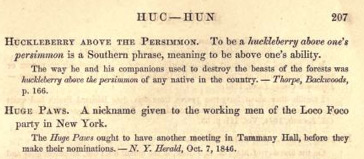
Image: The Dictionary of Americanisms
I enjoyed two articles in The Atlantic by historian Benjamin Schmidt: one looking at the movie Lincoln, and the other at episodes of Mad Men, in which he used computers to compare the language used in each by characters to a corpus of actual published works from the same era, with the goal of flagging any modern terminology or phraseology that snuck into supposedly period-accurate works. (For example, “snuck” is a word he cites as becoming common decades too late to be accurate to Lincoln’s time.)
From the Lincoln article:
It turns out Kushner didn’t reach for that OED as much as he could have. Mary Todd complains about Thaddeus Stevens’s “prosecutorial” interest in her accounts, but the word wasn’t used at all until 1934, and not widely until Watergate. As others have noted, everyone said “sneaked,” not “snuck,” until the 20th century, and the “barrage” of artillery Edwin Stanton plans for Wilmington only entered English around 1900. And the “bipartisanship” at the heart of the movie’s narrative? The dictionary says the term only entered the language in 1909, although I’ve found a few occurrences from the 1890s.
And Mad Men:
What seems to be the most ubiquitous mistake in Mad Men is so frequent as to be invisible: the phrase “I need to.” Modern scripts set in 1960s, including Mad Men, use it constantly: it’s about as frequent as everyday words like “good,” “between,” or “most.” But to say “I need to” so much is a surprisingly modern practice: books, television shows, and movies from the 1960s use it at least ten times less often, and many never use it all. Sixties dialogue written back then used “ought to” far more often than modern imitators do.
I love this type of stuff. In Dispatches from Wondermark Manor I of course tried to affect a quasi-Victorian style of writing, but completely absurdly and with a deliberate disregard for accuracy…and yet, when I went back to assemble the complete edition, revisiting texts that in some cases I’d written years earlier, I absolutely made changes based on my improved understanding of Victorian language. Stuff just stood out to me as wrong.
I remember replacing tsunami with cyclone and zeppelin (as a generic term for airship) with dirigible. I also snuck, er, sneaked in some particularly juicy turns of phrase that I’d come across in period literature that charmed me with how different they sounded from something written today.
But I rather love the mishmash, as well — obviously someone striving for period accuracy would do well to try to use the language of the day in the manner in which it was actually used, but there’s something charming to me about adopting the trappings of a different era but putting a little bit of a modern voice into it. It becomes new; it’s something we couldn’t have gotten from the real era. It’s science fiction: traveling back to the world of Kennedy or LBJ or Queen Victoria or Abraham Lincoln, getting to put on those clothes and talk about those issues, but bringing a little 2013 with you in a way that they never would have done. It’s inventive.
Oh no you guys this was an accident but I — I think I just invented steampunk
